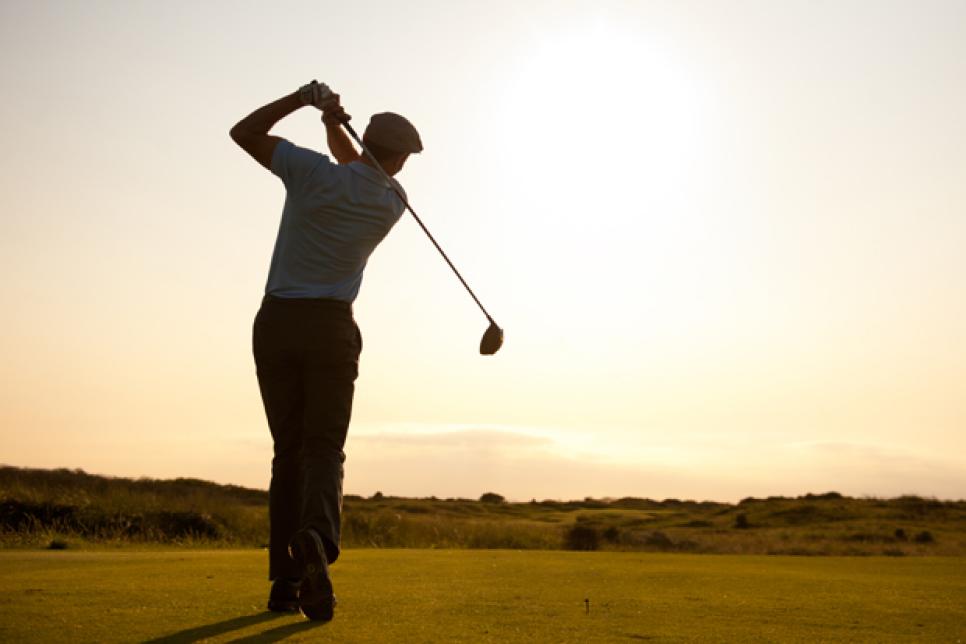News
The Solitary Search Starts Again

The Masters is upon us, once again inspiring the golfing heart like the Wodehouse morning "when all nature shouted Fore!"
I'm anxious to get on the course, but as finding the actual time gets more challenging, it's hit me that in all these years I've gotten as much pleasure from the thinking about how to play better as I have from the actual playing.
Basically, I'm a compulsive golf experimenter. As pointless and counterproductive as it seems to most, I love to assess the flaws in my game and incessantly consider possible antidotes, the whole process springing from the vain belief that I know I can be better than this. It doesn't take much for a new idea to gain temporary currency -- putting at a table leg, air-swinging before the reflection from a sliding glass door or just watching Golf Channel. Often, the obsession needs only the mind's eye and a quiet moment, and perhaps a scrap of paper to urgently write down something vague and perishable like "Swing PAST the ball."
My search is for a personal unified field theory, the key idea that will suddenly get my weak limbs and soft core moving with athletic cohesion, leading to pure contact, power, accuracy and repeatability. I know such a flimsy approach is a presumptuous shortcut, arrogant in its ignorance, and, if precedent matters at all, doomed. Yet it's the chase that for me makes the game intoxicating.
I'm currently pursuing some ideas gleaned from Dick Mayer's rich but obscure account of a putting lesson from Bobby Locke, thus my suddenly closed stance and inside takeaway on the greens. On the full swing, a recent passing comment from Raymond Floyd about how all good players "cover the ball" has me finishing in a Tempo Raymundo-style forward lean. Both imitations are likely to be short-lived, but at the moment, I'm considering them prime candidates to make the permanent cut.
All this jacking around doesn't mean I don't respect the work of the great instructors (Leadbetter, Toski, Haney, Harmon et al.) that I've had the privilege to converse with and listen to and occasionally take (an always helpful) lesson from. As a group, they've been my biggest source of insight into the game. But all acknowledge that learning, especially about how to get better at golf, requires a deeply personal engagement. It's a nuanced and difficult process, and if both teacher and student are honest, the mystery always remains.
It's why reliance on a teacher is tricky. In a recent New Yorker article, the concert pianist Jeremy Denk, in a first-person piece about the stages of learning, writes about how he "slipped into the dangerous state of craving a guru, someone who would tie it all together." When he thought he had found such a teacher, he regressed, finally realizing that it was because "my idea of music merged with my idea of him."
Similarly, I believe that competitive golf is still recovering from the way David Leadbetter helped Nick Faldo win majors with an apparent mechanic/machine relationship. It can't be a coincidence that the two finest strikers ever by acclama- tion -- Hogan and Trevino -- worked it out themselves.
As Hank Haney recently told pupil Michael Phelps on his television show, "This whole thing is up to you. It's not up to me." Master professional Michael Hebron doesn't even like to use the word teacher, preferring the term "learnist" -- one who facilitates moments of self discovery. The last sentence of Denk's story says of teachers, "They have given all the help they can; the only person who can solve the labyrinth of yourself is you." When Arnold Palmer warmly urges, "Swing YOUR swing," he's saying that somewhere in all of us, after fundamentals are absorbed, there are things we do naturally that we should never abandon. I give you Inbee Park.
I've enjoyed going it alone too much to settle on "my" swing, although if I had been good enough to have my scores put in the newspaper, I'm pretty sure I would have. I won't argue that I'm a head case, a player who gets in his own way and makes the game too complicated.
But I also know that when I do get out, usually in the late afternoon at Mid Pines GC in the sandhills of North Carolina, a Donald Ross original with a recently restored naturalness that evokes a smaller-scale Pine Valley, and hit a good shot that no one else witnesses, that act alone, and all the thought that went into it, lives inside me like few other things ever have.
Let the season begin.

